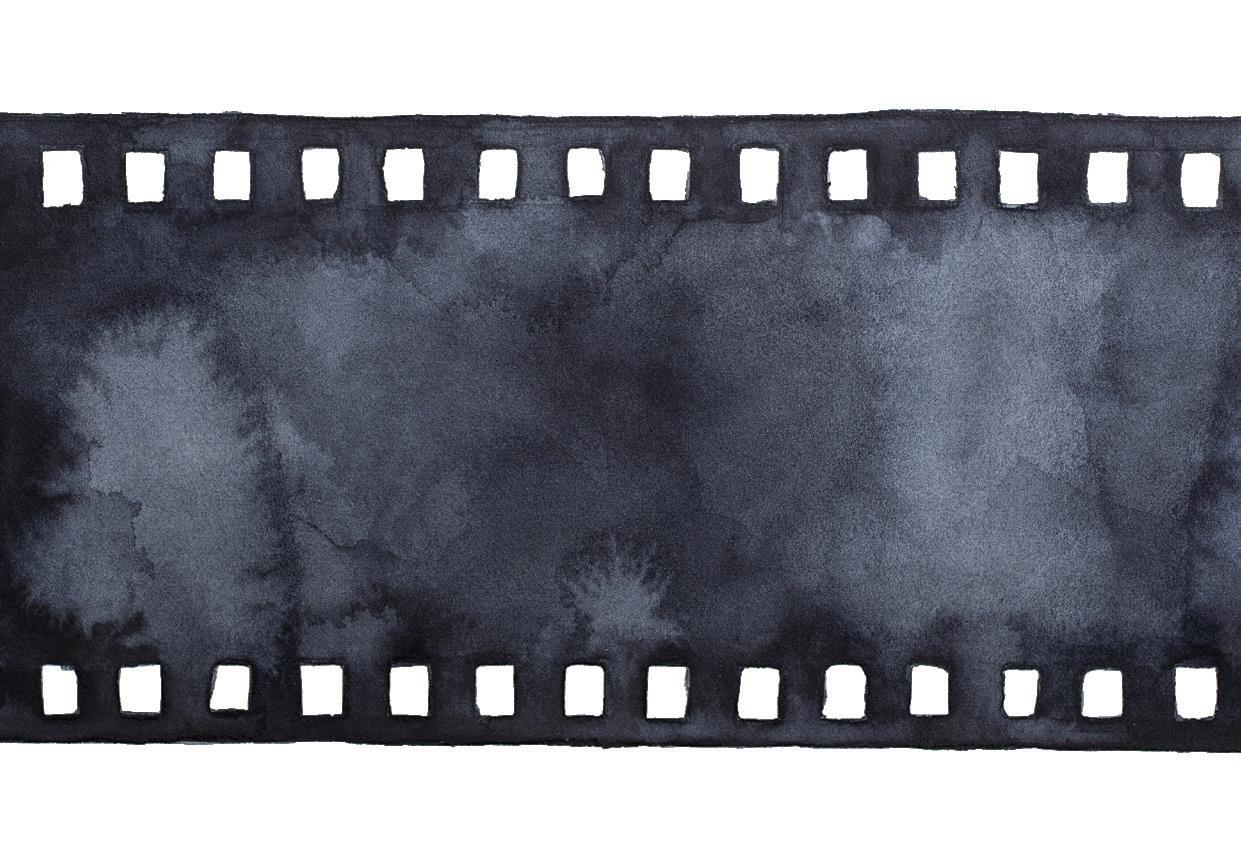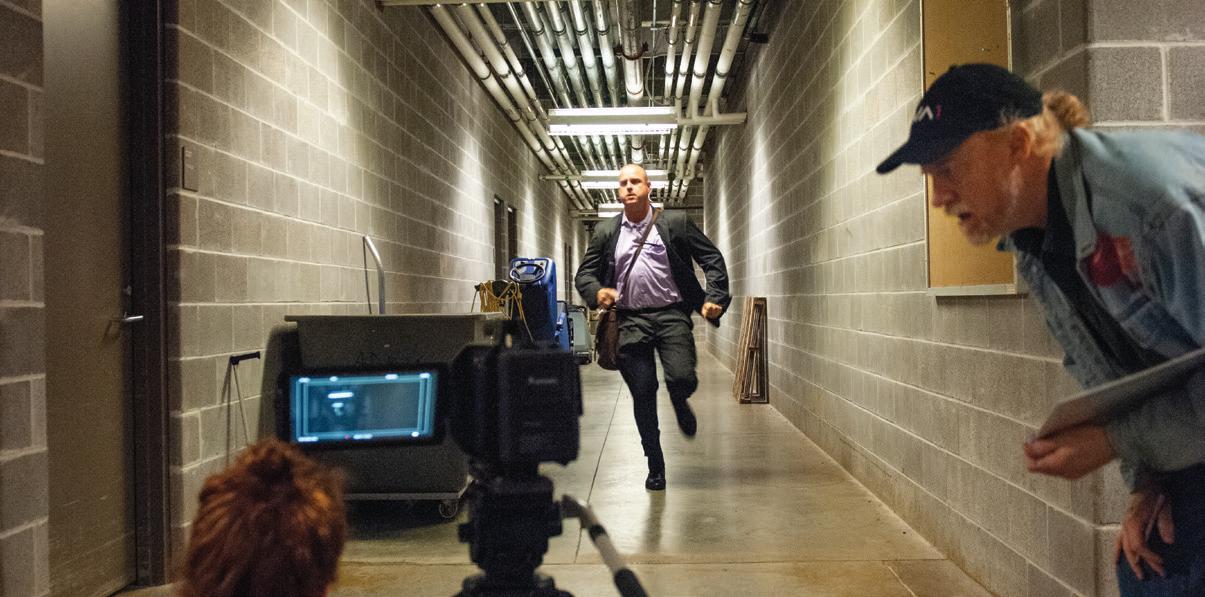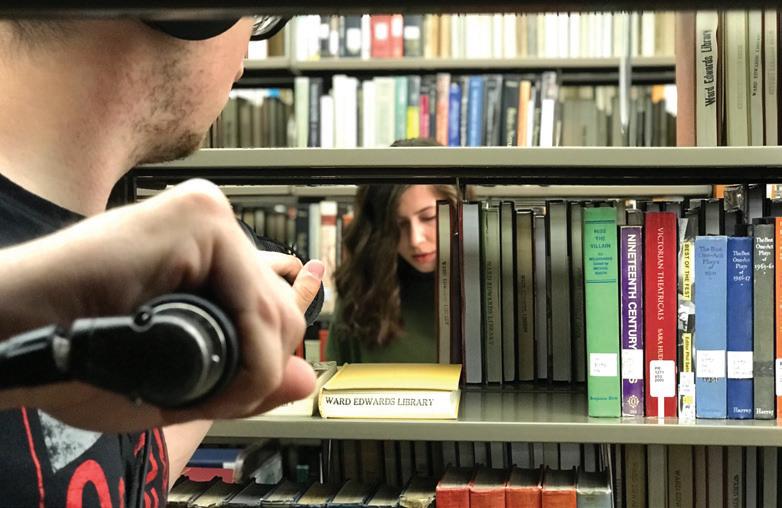
6 minute read
UCM AT THE MOVIES
'The Computer Lab' Film Series is a Community Collaboration

Kylie Jacks, '19, sits down to read the mysterious messages written on the memory jar rocks from her mother's funeral in Episode 3 of "The Computer Lab."
Professor Emeritus Arthur Rennels retired this summer as chair of the School of Communication, History and Interdisciplinary Studies after 20 years at UCM. As part of his legacy, he leaves behind a project that grew from a seed he planted to give students the opportunity to create a film series. Students applied for the “Producing a Web Series” special topics project in spring of 2018, indicating which crew positions interested them, and production started that fall.
One Theatre major and two Music Technology students enrolled; the rest were part of UCM’s Digital Media Production (DMP) program, where associate professors Mark von Schlemmer and Michael Graves collaborated to develop the concept for “The Computer Lab.”
“Mark and I were both interested in sci-fi,” Graves says, hesitating to confine “The Computer Lab” to a genre while drawing parallels to shows like “Stranger Things,” “The Twilight Zone” and “Black Mirror.” “There’s an old adage: there’s the film you write, the film you shoot and the film you edit. We had the great fortune to work with amazingly talented student and faculty collaborators, who helped shape the world, characters and tone of ‘The Computer Lab’ into the version you see today.”
A 2020 Opportunity Grant from the UCM Alumni Foundation funded a Mac Pro, a powerful computer that can handle editing video shot in 4K, the industry standard. This and other Opportunity Grants are made possible by private contributions to the university’s unrestricted Central Annual Fund.
“The students got experience working extensively with 4K footage … and realized that takes twice as long to copy,” says von Schlemmer, who taught “Producing a Web Series” and applied for the grant. “The night doesn’t end when you say cut; it ends when you get the terabytes of footage we just shot moved over to hard drives and backed up.”

Actor and UCM instructor Aaron Scully races through an underground corridor on campus as professor Mark von Schlemmer directs.
Although the crew was primarily from the DMP program, the project involved talent from many disciplines at the university. Students, faculty and alumni were cast in lead roles, and students in Graves’ film appreciation class played “extras” in the four-part series. Graves, who wrote the screenplays based on stories that he and von Schlemmer conceptualized, says the storyline across episodes is loosely based on Plato’s allegory of the cave. Being colorblind, Graves knows he sees things differently than the majority of people and has always been intrigued with the distinction between reality and perception. He made George Berkley’s “to be is to be perceived” a recurring phrase throughout the series.
Theatre and Dance instructor Aaron Scully, ’12 and ’14, stars as a troubled professor who is very much still “in the dark” in Episode 1, titled “Escape Velocity.” The office in the Martin Building that became the “computer lab” was designed to be cavelike with one bare light bulb hanging over the computer that the lead characters in all four episodes happened upon. To make the set look neglected and forgotten, the crew brought in a variety of vintage computers, including one that was used to find a record Mersenne prime number, one of four such discoveries made at UCM since 2005. With supplies donated by OnPoint Contracting and pizza by Papa Murphy’s, students transformed the room that would become the hub connecting the self-contained but eerily conjoined episodes. The Warrensburg Fire Department even joined in the action, with Terry Hill, Rusty Bond and Weston Farmer, ’13, bringing a fire truck out for a night scene.
Richard “Buzz” Herman, ’78, former UCM Theatre chair and namesake of the university's Richard Herman Black Box Theatre, stars in Episode 2, "Night Blindness," as a down-on-his-luck custodian trying to work his way back into his daughter's life. Jennifer Renfrow, ’99, director of Center Stage Academy of the Performing Arts in Warrensburg, plays Herman’s estranged daughter. Renfrow studied under Buzz at UCM and says she had a great time performing with him off stage.
Renfrow arranged auditions through Center Stage to cast a child to play a younger version of the lead role in Episode 3, “Between and Betwixt.” The lead character, a woman who has an unexpected encounter after her mother's funeral, is played by Kylie Jacks, '19, an English Language and Literature major who was enrolled in Graves' screenwriting class. Filming of the funeral took place at UCM's Alumni Memorial Chapel, and Jack's character is employed shelving books at James C. Kirkpatrick Library, where she worked in real life as a tutor in the Writing Center.
“Some scenes were right next to where I would go to work nearly every day," says Jacks, who had never acted before being cast as the episode's lead. “When I wasn’t fretting about forgetting my lines, I was truly in awe of production. I remember looking around during some of our sets and thinking it was so cool how production made something out of nothing. I also found it kind of exhilarating to pretend to be someone else, and to try my best to forget about the camera and the boom mic above my head.”

Noah Stump, a DMP student, holds the boom mic for actress Kylie Jacks, an English major, through the book shelves at JCK Library.
In one of Jacks’ favorite scenes, the camera remained stationary, peering through a gap between books on a shelf while she moved progressively farther away. Von Schlemmer, who directed and edited the episode, notes that books are good soundproofing and jokes that he owes an apology to librarians who may continue to find titles out of order.
Chris Moore, ’12, ’19, was a graduate student in the Communication program when he took Graves’ screenwriting class and cowrote Episode 4, “Shadowplay,” which he also directed. In the allegory of the cave, this final episode would symbolize emergence after the lead character’s realization that what she’s been seeing has been merely shadows — that there is a whole reality beyond the cave.
Moore’s wife, Natasha, ’12, ’18, stars in the episode as a philosophy professor who has a paranormal experience after being fired. This leads to an exploration of larger elements that have been in play throughout the series, including the elusive turtle motif.
“When I came on I really wanted to direct, and it was everything I had hoped it would be; it fanned the flames,” Moore says of the experience. “From a student’s perspective, there’s a lot you can learn in a classroom, but only so much … this is the most on-hands learning you could do.”
When the four episodes are combined, the project equates to a feature-length film — quite an accomplishment for students and an experience they can take with them into their careers. This was a project that allowed students across various disciplines to work together toward a common achievement.
“We created something bigger and better than what we thought it would be,” von Schlemmer says. “Students now are getting more out of it than we even thought at the time. It’s a real-life example they can relate to and shows they can do it right here at UCM.”

Steve Fracol, a professional steadicam operator, shows student crew members Zach Nowlan and Colin O'Brien a few filming tricks in the basement of Humphreys.
Projects like “The Computer Lab” are made possible by gifts to the unrestricted Central Annual Fund. Thank you for enabling the UCM Alumni Foundation to award $40,000 worth of Opportunity Grants in fiscal year 2020. Donate at ucmfoundation.org/give/mag.




